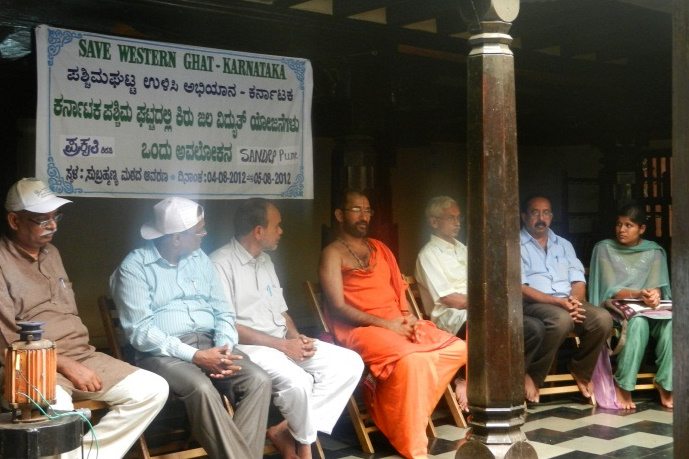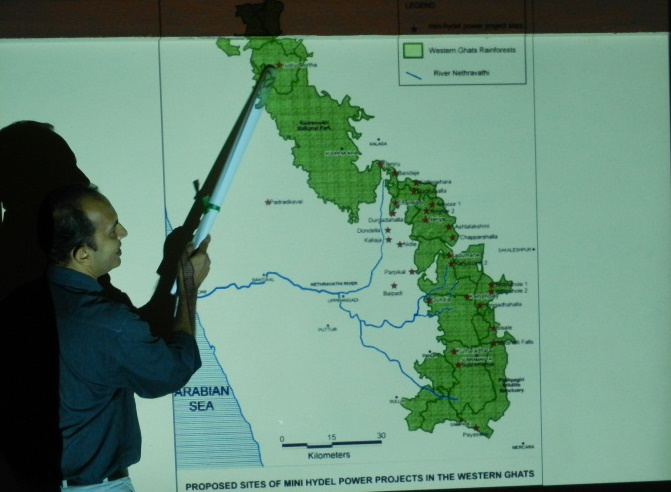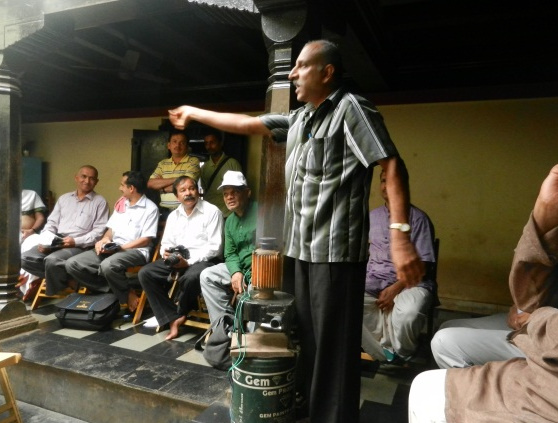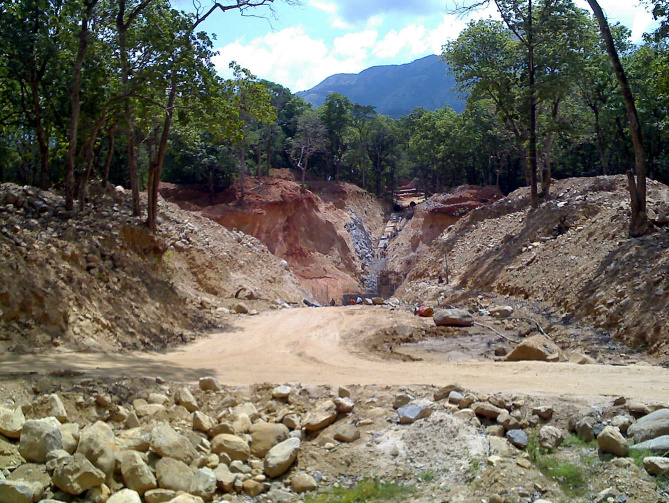On the 4th and 5th of August 2012, Civil Society Organisations Prakruti, South Asia Network on Dams, Rivers and People (SANDRP) and Save Western Ghats Movement organised a two day workshop on Impacts of Mini Hydel Projects (MHPs) on Communities and Ecology in Karnataka, with a main objective to give voice to the numerous unrecorded impacts and hardships of Karnataka’s mini hydel (Mini hydel projects are hydroelectricity projects with installed capacity less than 25 MW) spree on local communities and fragile ecosystems.

Participants shared multiple impacts of MHPS in their regions, and brainstormed about a way forward
Despite heavy rains and overflowing rivers, the workshop was attended by over 60 affected local farmers, fishermen, scientists, activists and researchers from Dakshin Kannada, Uttar Kannada, Shimoga and Hassan. Panduranga Hegde from Prakruti, Jannardana GL from ESC, Shimoga, H. A. Kishore Kumar from Malanadu Janapara Horata Samiti, Niren Jain from Kudrmukh Wildlife Foundation, Shri. Ratnakar, noted micro hydel specialist, SANDRP, besides affected communities, were a part of the meeting. Swamiji from Kukke Matth inaugurated the meeting. Participants shared multiple impacts of MHPS in their regions, and brainstormed about a way forward.
The meeting culminated in a joint statement ‘Subramanya Declaration’ put forth by communities, researchers, scientists and organisations which calls for halting the current unregulated development, greater regulation of the sector, cancelling projects which affect biodiversity and livelihoods, encourage sub mega-watt options like micro hydel projects and stop privatisation of natural resources. Participants have demanded that unless these outstanding issues are resolved, no new mini hydel projects should be sanctioned and agencies and departments which have given permissions in a hurry or for other causes should be immediately brought to the books.

Niren Jain from Kudremukh Wildlife Foundation talking about impacts of MHPS in Western Ghat Forests (Photo: SANDRP)
Background
Karnataka is in the forefront of setting up numerous MHPs on its rivers and streams. KRDEL (Karnataka Renewable energy Development Limited) Website states that Karnataka Government is considering 836 mini hydel projects with a combined capacity of over 4000 MW [1]. In Dakshin Kannada District alone there are nearly 108 mini hydel projects commissioned, under construction or in planning stages on Netrvathi, kumaradhra and Gundis Rivers, which are some of India’s ecologically richest rivers, while Cauvery Basin has 146 such projects!
MHPs can indeed be clean, green and welcome if they make an effort to have minimum ecological impacts, are participatory and democratic in planning and functioning, and if they contribute to sustainable local development in some way while producing electricity. Simply assuming that a Mini Hydel Project will be green and clean by default is clearly wrong. To be sustainable, the project proponents as well as sanctioning bodies will have to make a conscious effort in that direction. Unfortunately, the ground reality in Karnataka is shocking to say the least.

Shri. Ratnakar talks about installing micro hydel plants
The current MHP development in Karnataka is happening like an extremely hurried Gold Rush, entirely unregulated and with serious questions being about its sustainability and transparency. Private players are competing with each other to set up maximum MHPs on rivers. These projects which supply energy to the grid do not need Environmental Impact Assessment (EIA), Public Hearing, Environmental Clearance (EC) or Environmental Monitoring. Though called ‘mini,’ they entail dams which are at times higher than 10mts. This onslaught is having a huge negative impact on the ecology and local livelihoods of the region.
The administration has no time to look at impacts borne by locals and ecosystems, but is busy sanctioning more and more projects. Many of these undemocratic, unsustainable projects have applied for Carbon Credits under the Clean Development Mechanism (CDM) of the UNFCCC. They are getting millions of rupees additional revenue, in addition to tax rebates and subsidise from the centre and state that they enjoy. None of these benefits are passed on to the local communities and many claims made by the proponents in the document submitted to UNFCCC are fraudulent. Projects coming up by destroying globally threatened biodiversity are false solutions to climate change.
The current unchecked flood of MHPs in an effort to make a fast buck and is neither clean nor green. Serious steps will have to be taken by the administration to make the mini hydel sector sustainable. Karnataka High Court had ordered a stay on 72 MHPs in Western Ghats , back in April 2011, following a petition filed by Western Ghats Forum. However, projects in Western Ghats and other ecologically fragile areas are still being sanctioned.
These unregulated projects by ‘mini hydel mafias’ are giving a bad name to small scale clean energy initiatives.
As a sanctioning agency, KREDL, Karnataka Forest and Environment Department, Fisheries Department, Pollution Control Board, the Ministry of Environment and Forests, National CDM Authority have been turning a blind eye to all this blatant destruction and are responsible for this. It is high time that they look into this seriously. Mini Hydel Projects are being taken up all across the country and it will be wise to set a good example starting from Karnataka.
Fraudulent practises galore

Perla and Shemburi Projects in Bantwal: Two on paper, one on site (Photo: SANDRP)
- In order to claim CDM benefits and government subsidies, projects are being clubbed together example: AMR Perla and Rithwik Shemburi projects nearly Bantwal, Mangalore. On paper, both are 24.75 MW, with separate CDM claims, while on the ground, the project is one huge dam across Netravathi near Mangalore which has caused large submergence and even deaths due to sudden release of water in the downstream. [2] Locals have filed a case against this project in the Karnataka High Court.
- In a remarkable case which seems like a tip of the iceberg, Maruthi Power Gen actually showed two different projects on paper and in reality built a project bigger than 25 MW [3] , affecting more than 5 hectares of dense Western Ghats Forest in a bid to fool the Forest Department and milk the clause of no EIA needed for projects below 25 MW.
- 12.5 MW Nekkiladi Sahasralingeshwara project coming up near Puttur has started construction despite huge opposition from gram sabhas from both banks. Dam construction has started on one bank, while land acquisition is not even initiated on the other! [4]
- In case of 24.75 MW Kukke project near Hosmata on Kumaradhara River, the villagers are not given any details of submergence from the proponent. Although KRDEL has ordered the proponent to furnish these details immediately and stop work in the time being, it has still not done so! Even when Chairperson of the Western Ghats Task Force actually visited the place and assured locals that the project will not come up in the present form, land acquisition is going on in full swing! [5] This project will submerge not only houses and agricultural lands, but also highly endangered biodiversity including a plant Madhuca insignis rediscovered after 125 years. To top it all, it is also set to submerge a smaller hydel project in the upstream! [6]
- Projects like 24.75 MW Kukke Satge I MHP, 24 MW Kukke Satge II MHP, Sampladi MHP near Subramanya, etc., are set to affect community conserved fish sanctuaries, which are extremely special and protect rich endemic fish diversity of Karnataka Western Ghats. The Fisheries Department, instead of protecting these sanctuaries, is giving sanctions to projects without batting an eyelid, no questions asked!

Forest Destruction by a MHP in Hassan Photo: With thanks from Kishore Kumar, Hassan
- In the Cauvery basin, Projects like Limbavalli MHP are encroaching upon elephant corridors and have increased man-elephant conflicts [7] while projects barely one kilometre and 4 kilometres from Ranganthittu and Gende Hosahalli Bird Sanctuaries are being sanctioned by KREDL and are also applying for CDM credits.
- Cauvery Wildlife Sanctuary is already ravaged by multiple MHPs operating near Shivanasamudram Hydel plant and the Power Minister actually had to make a statement that new projects will not be allowed near this KPCL as they are diverting water and affecting power generation of the government project. [8]
- The cumulative impacts of such bumper to bumper projects on the protected areas and forests are beyond imagination and shockingly unaddressed.
- Modus operandi of the mini hydel operators seems to be getting a project of smaller installed capacity sanctioned and then keep on increasing the capacities and ownership by leaps and bounds.
Meeting
On the first day, 8 local groups presented the range of destruction caused by MHPs in their areas. Main issues raised were submergence, which was hidden by the project proponent till the last minute, absence of proper compensation, affected local water supply, increased man animal conflicts due to blockage of wildlife corridors, non-transparent and high handed behaviour of the proponent, frauds and lies, buying and breaking village solidarity with money, etc. The groups claimed that though they have raised these problems with the administration a number of times, they are being consistently overlooked. Gram Sabha resolutions against projects are not being respected.
This was followed by discussions by scientists, researchers, lawyers and activists about various facets of impacts of these projects. Niren Jain from Kudremukh Wildlife Foundation highlighted impacts of these projects on protected areas and threatened wildlife, while Kishore Kumar from Malanadu Janapara Horata Samiti talked about several illegalities of the projects, increased man animal conflicts and destruction of crops by elephants due to encroachment of projects on elephant corridors. Shr. Ratnakar, who has helped set up more than 200 micro hydel projects in Karanataka talked about the participatory, sustainable nature and distributed benefits of micro projects as against mini hydel projects.
The meeting culminated in a set of resolutions made by the stakeholders. These have been sent to the decision makers involved in planning and sanctioning Mini Hydel Projects in Karnataka like KREDL, Karnataka Forest and Environment Department , KSWB (Karnataka State Wildlife Board), KSBB (Karnataka State Biodiversity Board), , Fisheries Department, MoEF, etc,.
Subramanya Declaration
1. Rivers are a natural resource, not a private property. Water besides being a basic human right, belongs to all, including the ecosystem. First right to plan and manage water lies with the local community which inhabits the river basin. Government should not lease out rivers to private companies to maximise their profits, without even the consent of affected communities who depend on rivers.
2. Many MHPs are destroying lives and livelihoods of people who have traditionally depended on rivers like fishermen and farmers. The extent of destruction by MHPs is out to see, but the government continues to ignore this. We urge the government to assess the impacts of these projects on existing livelihoods and cancel projects which severely affect local ecosystem-based livelihoods.
3. Numerous MHPs are being set up in ecologically fragile areas, ESZ I areas according to Western Ghats Expert Ecology Panel (WGEEP) REport, Western Ghats Forests and reserve forests. They are affecting elephant corridors and community conserved areas like Devaranya and Fish Sanctuaries. They are causing sustained loss to the biodiversity through blasting, construction, tunnelling and transmission lines. All this is increasing man animal conflict, besides affecting invaluable biodiversity. However, the government is sanctioning these projects with no question being asked, no preconditions and no monitoring mechanisms in place. We urge the government to cancel projects in and affecting protected areas, forest areas, community conserved areas and wildlife corridors.
4. Regulation of the sector: Mini Hydel Projects are entirely unregulated currently. Neither are their impacts studied beforehand, nor is there a monitoring or management mechanism in place to address these impacts. All costs of impacts are externalised to the communities and ecosystems while private companies only pocket the profit.
- We demand that individual mini hydel projects should conduct EIA, public hearing and Environmental Clearance process with community participation.
- Before setting up the project, the proponents should disclose all the details about the impacts of the projects including submergence, water release details, compensation, etc.
- No Objection Certificates should be solicited not only from gram panchayats where dam is built, but also from those Pachayats in the upstream and downstream which will be affected by the project.
- There should be a stringent safety mechanism in place warning locals about sudden water release beforehand. People have lost their lives due to sudden water releases by mini hydel projects.
- The administration should constitute an empowered monitoring committee with 50% local participation to periodically monitor projects.
- Cumulative Impact Assessment should be mandatory for rivers which have more than 3 MHPS on them.
- Distance of free flowing rivers between two projects should be decided. In any case, a single village should not have more than one project.
- The projects should release eflows in the downstream at all times to fulfil the needs to the ecosystem. They should have fish ladders and passes for fish migration.
We request the government that in view of the people and ecology of Karnataka, all MHP development should be halted until the points raised above are addressed and resolved.
For further details:
Panduranga Hegde, Prakruti, SWGM, Karnataka,
9448818099,appiko@gmail.com
GL Janardhana, Environmental Study Centre, Shimoga, 9480431983
Parineeta Dandekar, South Asia Network on Dams, Rivers and People (SANDRP), Pune
9860030742, parineeta.dandekar@gmail.com
References:
1. Small hydro projects - Karnataka Renewable Energy Development Ltd - http://www.kredltest.in/hydroreport.aspx
2. Bantwal: Drowning of Students - People Up in Arms against AMR Project; Daijiworld, dated December 12, 2011 - http://www.daijiworld.com/news/news_disp.asp?n_id=124443
3. Maruti Power Gen's hydel project an environmental disaster; DNA, dated November 25, 2011 - http://www.dnaindia.com/bangalore/report_maruti-power-gen-s-hydel-project-an-environmental-disaster_1617237
4. They need little land to build this dam; DNA, dated July 16, 2012 - http://www.dnaindia.com/bangalore/report_they-need-little-land-to-build-this-dam_1715606
5. Why the 24 MW Kukke Hydro in Karnataka should not get CDM credits - http://sandrp.in/hydropower/Why_the_24_MW_Kukke_Hydro_in_Karnataka_should_not_get_CDM_credits.pdf/view?searchterm=kukke
6. A hydel project that will submerge another; DNA, dated June 4, 2012 - www.dnaindia.com/bangalore/report_a-hydel-project-that-will-submerge-another_1698006
7. DNA exclusive: Minister plants 12 MW mischief for elephants - DNA, dated July 19, 2012 - http://www.dnaindia.com/bangalore/report_dna-exclusive-minister-plants-12-mw-mischief-for-elephants_1716882
8. Karnataka govt will buy out mini hydel plants; DNA, dated July 1, 2011 - http://www.dnaindia.com/bangalore/report_karnataka-govt-will-buy-out-mini-hydel-plants_1561066





 press_release_halt_shp_karnatka_080812.pdf
press_release_halt_shp_karnatka_080812.pdf







